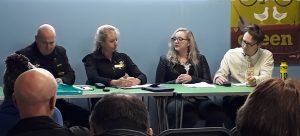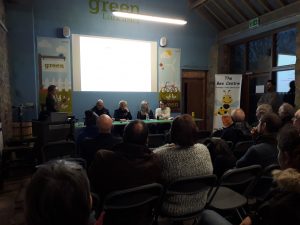Bee debate 29 November 2018
Lancaster University Bee Keepers – Event
Debate on the theme of:
Genetic diversity versus breeding black bees: the pros and cons
Date: Thursday 29 November 2018, 4-6pm
Venue: Eco Hub, the barn
The debate will feature expert panelists:
Dr. Phil Donkersley and Alexis Brownlee from LEC,
versus
Kath & Simon Cordingley from the Bee Centre (www.TheBeeCentre.org).
The debate will start with presentations by the panelists, who then will address questions from experts. The debate will end with open questions from the audience on the theme of genetic diversity and honey bee breeding.
Flyer of the debate
* * * * * * * * * * * *
Aftermaths…
As many beekeepers in our country, winter is the time for “alternative beekeeping activities”: maintenance, reading, studying for modules, and club events. So, as many clubs, Lancaster University Bee Keepers hosted his first all-public event: a debate on the theme of “genetic diversity versus breeding the black bee – the pros and cons”. The debate took place at the Eco Hub, a “green” site on campus managed by Green Lancaster (a collaborative initiative run by Lancaster University and Lancaster University Students’ Union). The panelists of the debate were, on one side, Dr Philip Donkersley and Alexis Brownlee, both from Lancaster University Environment Centre and arguing in “favour” of genetic diversity, and on the other side Kath and Simon Cordingley from The Bee Centre and arguing in “favour” of breeding localised bees based on the black bee. The audience, about 20 people, was mixed, with a majority of beekeepers from Lancashire and North West BKA, and a handful of local people; and with an age ranging from approx 20 to 80 years old. The debate started with each team presenting their arguments, all based on scientific facts and historical data – no place for subjective or “political” claims. Each team deliberated for 20 minutes each, and we then opened the discussion inviting questions and comments from the audience. The “happy ending” could be summarised in saying that both teams agreed: we should stop importing bees, and instead encourage and help our fellow beekeepers to breed their own locally adapted bees, Apis mellifera mellifera, which already present a great genetic diversity. Some may ask why should we breed AMMs instead of other subspecies of the Apis mellifera? Well, our panelists demonstrated that the AMMs have been proved to be “the” naturally occuring honey bee in the UK. The arguments presented by our four panelists were based on scientific experiments and their results – not on the hearsay that AMMs have such or such desirable trait. As a mathematician myself, I can ascertain that their proof is sound.
The entire debate lasted almost 2h, and the main part was video recorded; we hope to be able to make this available on the web, provided the video and audio files can be made into a consolidated watchable video. Off the record, we all engaged in discussions with a hot brew, very welcome in a stormy afternoon in November.
Beyond the informed and civilised debate and discussions, one major benefit of the event was the opportunity to meet new people and exchange our experiences (good and bad) with honey bees.
If you missed our first event, I only can recommend that you attend the next ones! Please keep an eye on our website.


